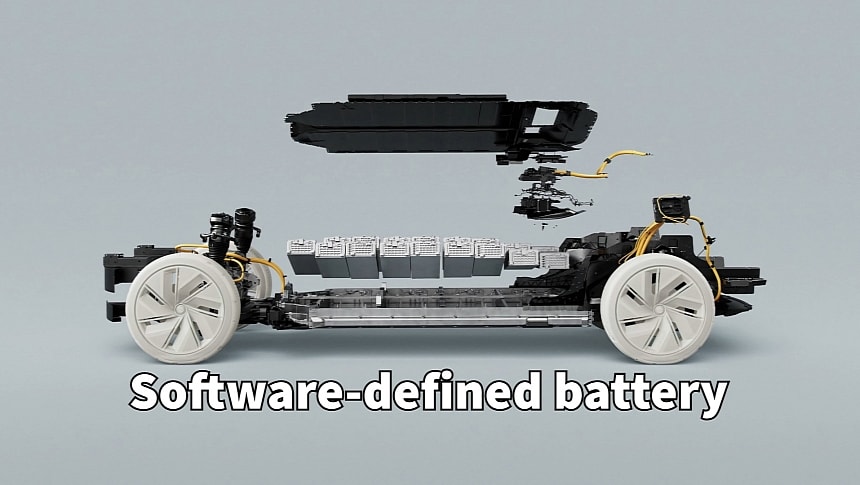Volvo partnered with the Imperial College London spinoff Breathe Battery Technologies, a startup that developed an innovative battery management platform. By optimizing the charging algorithms, the new battery management system can reduce EV charging time by up to 30% without affecting durability. Even better, the new platform can work with existing EVs.
Even though electric vehicles have become more popular in the past few years, people still mention that high prices, long charging times, and limited range are the reasons why they postpone an EV purchase. While it's true that EVs are still more expensive than their ICE counterparts, recent EV models have improved on all three metrics. On average, electric cars need less than half an hour to charge from 10% to 80% and can go over 300 miles (483 km) miles on a charge.
Of course, there's always room to improve, which is why Volvo partnered with Breathe Battery Technologies. The startup, an Imperial College London spinoff, developed a battery management technology that can significantly reduce EV charging times. Volvo is the first EV maker to use Breathe Battery Technologies' algorithm-enabled charging software.
According to the Swedish carmaker, Breathe's software integrates with its own battery management platform, allowing Volvo EVs to charge up to 30% faster. In real-world tests, the new charging algorithms have improved charging times between 15% and 30%. This improvement is possible without affecting energy density or range. It will last the entire battery's lifetime without impacting its health status. It's like using DC fast charging without affecting battery durability, something EV makers have always dreamed of offering.
Unlike traditional stepped charging, which relies on pre-determined rules, Breathe's algorithms use adaptive charging to dynamically control the charging current in real time. The software also takes into account the battery's health to accelerate charging without the risk of lithium plating, which can affect the battery's performance and durability.
Because the improvement in charging time does not depend on the battery type or other characteristics of the electric car, Volvo talks about software-defined batteries. Indeed, Breathe's software works seamlessly with existing vehicles and batteries. There's no need to change the battery chemistry or design, thus having no environmental impact. The new tech changes the software algorithms, making scaling up simple. Volvo expects the new charging software to make its way to the next generation of its electric vehicles.
While reducing charging time by up to 30% sounds impressive, many are skeptical that Volvo could achieve this. Many battery manufacturers are working on what they call "extreme-fast-charging battery cells," which would allow for a significant reduction in charging time. However, these companies have yet to offer commercial products. If Volvo can pull it off without changing the battery design and affecting its durability, it will have a killer, unique selling point for its EVs.
Of course, there's always room to improve, which is why Volvo partnered with Breathe Battery Technologies. The startup, an Imperial College London spinoff, developed a battery management technology that can significantly reduce EV charging times. Volvo is the first EV maker to use Breathe Battery Technologies' algorithm-enabled charging software.
According to the Swedish carmaker, Breathe's software integrates with its own battery management platform, allowing Volvo EVs to charge up to 30% faster. In real-world tests, the new charging algorithms have improved charging times between 15% and 30%. This improvement is possible without affecting energy density or range. It will last the entire battery's lifetime without impacting its health status. It's like using DC fast charging without affecting battery durability, something EV makers have always dreamed of offering.
Unlike traditional stepped charging, which relies on pre-determined rules, Breathe's algorithms use adaptive charging to dynamically control the charging current in real time. The software also takes into account the battery's health to accelerate charging without the risk of lithium plating, which can affect the battery's performance and durability.
Because the improvement in charging time does not depend on the battery type or other characteristics of the electric car, Volvo talks about software-defined batteries. Indeed, Breathe's software works seamlessly with existing vehicles and batteries. There's no need to change the battery chemistry or design, thus having no environmental impact. The new tech changes the software algorithms, making scaling up simple. Volvo expects the new charging software to make its way to the next generation of its electric vehicles.
While reducing charging time by up to 30% sounds impressive, many are skeptical that Volvo could achieve this. Many battery manufacturers are working on what they call "extreme-fast-charging battery cells," which would allow for a significant reduction in charging time. However, these companies have yet to offer commercial products. If Volvo can pull it off without changing the battery design and affecting its durability, it will have a killer, unique selling point for its EVs.







